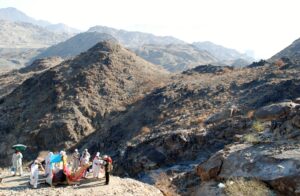A Black Woman’s Faithful Heart Inspires Action

Imagine a desert. Dry. Barren. Scorching heat.
You’re thirsty. Your baby is crying.
And there’s not a single drop of water in sight.
This was the desperate situation in which Hajar (Hagar), a Black enslaved woman found herself. Sarah, Ibraheem’s (Abraham) first wife, banished Hajar and her infant son Ismail (Ishmael). When Ibraheem left Hajar and their son in the desert of what is now known as Mecca, she had nothing and no one.
But God.
Ibraheem prayed:
“Our Lord, I have resided part of my progeny in an uncultivated valley near your Sacred Dwelling. My Lord, so that they may uphold the community, let the hearts of the people incline towards them and give provisions to them of the fruits so that they may give thanks.” [The Holy Qur’an, 14:37]
He handed Hajar some water and dates.
And deserted them.
When Hajar ran out of water and could no longer nurse Ismail, he began to cry. She frantically ran up, down, and between two hills to the point of exhaustion, hoping that with better vantage points she could find help.
Finally, the archangel Jibreel (Gabriel) appeared to her, offering words of comfort. At the feet of baby Ismail, who was crying and kicking his feet in the sand, sprung forth a gush of water. This well became known as Zam-Zam, and its nourishment enabled Hajar and Ismail to survive.
“God heard the boy crying, and the angel of God called to Hagar from heaven and said to her, ‘What is the matter, Hagar? Do not be afraid; God has heard the boy crying as he lies there. Lift the boy up and take him by the hand, for I will make him into a great nation.’” [The Holy Bible, Genesis 21:17-19]
The Holy Qur’an documents the prophet Ibraheem’s deep love for Hajar and their son, from whom the prophet Muhammad is descended. Because of Hajar’s firm faith in God’s promise, and in the reminder that Jibreel delivered to her, Muslims have an enslaved Black woman on whose life we base one of the five main ‘pillars’ of our faith: the Hajj, the pilgrimage to Mecca.
Today, two billion Muslims have as one of our goals in life to undertake the Hajj. During the pilgrimage, we retrace Hajar’s footsteps, remember her struggles, and reflect on their lessons. Every year, millions of us complete the Hajj and it’s a highlight of our lives.
The Hajj culminates with the most significant holiday of the Muslim faith: Eid al-Adha, or Festival of the Sacrifice. Just like the rituals of the pilgrimage itself, this holy day is also centered on Hajar, Ibraheem, and Ismail – ancestors of the prophet Muhammad.
Despite Sarah’s jealousy, Hajar’s story is a beautiful, inspiring account of a faith-filled woman. Ibraheem loved her dearly. She was obedient to God. She didn’t resign herself to her trials, but acted on them, which is incredibly empowering for anyone to emulate, but particularly for women.
Hajar modeled for us firm faith when facing a harsh environment. She did not despair, but rather took action. Yes, she prayed, as did Ibraheem.
But she also took action.
Today, as we find ourselves facing harsh environments due to climate change, we also find that the extreme weather conditions creating them are gaining in frequency, intensity, and impact. And it’s easy to become weary, to feel hopelessness creeping in. From droughts in the western US to wildfires in eastern Canada, Earth is crying out to us just as Ismail cried out to Hajar.
As people of faith, we do not despair, but rather model our prayers and our approach after a woman of God, a Black enslaved woman whose trust in God, followed up with taking action, saved lives. In this moment, the example of Hajar’s faith gives us hope.
About the Author:
Priscilla Martínez, Blessed Tomorrow, Climate Justice Fellow
Additional Resources:
American Climate Leadership Awards 2023 Broadcast Recording
ecoAmerica American Climate Leadership Awards Replication Guides
